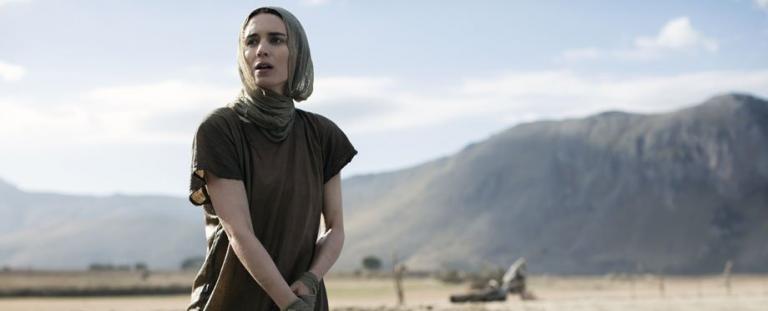“I will be heard.” So said Rooney Mara’s Mary Magdalene in the first trailer for the film about her character. But it has taken a while for her voice to arrive, at least in North America. The trailer came out in 2017, and the film was released to European and Australian theatres in time for Easter 2018. But the film’s North American release was delayed when Harvey Weinstein, who owned the domestic distribution rights, got hit with dozens of accusations of sexual assault. Now, finally, the film has another distributor and has landed on North American shores. Last week it premiered in North American theatres, and today it is available digitally as well (at least in the U.S.).
To mark the occasion, I spoke to producer Iain Canning, who called from Los Angeles. What follows is a lightly edited transcript of our conversation.
–
This film was first announced over three years ago, and it’s finally come to North America now. I wanted to get a sense of how the project started. Did it originate with producers, with screenwriters, with actors even? Where did it all begin?
Canning: Four or five years ago now, it must have been, we had made a number of films with male protagonists, and I guess we were sort of thinking that that was too much the tide of the film industry, in some ways. So we wanted to really– not deep dive, because there are so many great female protagonist stories– and then we went from just stories to history to stories of faith, and came across Mary Magdalene, which is just such an important story that we felt would be intriguing. But if I’m honest, we came at it thinking, “Oh, well, it’s a story of love and understanding and faith, but it’s also a story about Mary Magdalene the prostitute.” So once we started to read more about Mary Magdalene and really be consumed by her story– because of course, the prostitute story has for quite some time now not been the predominant narrative that should be told about Mary Magdalene– so that really just drove us into wanting to be a part of putting something out into the world that would add to the chorus of the non-prostitute story about her. So that, along with a writer called Helen Edmundson who wrote a first draft of the script, we started to put together a script version of Mary’s story while being influenced by the conversation around the Gospel of Mary, the fragments that had shown up in Greece relatively recently. So that’s how it started.
You mentioned that you were looking for stories about women and you went to stories of faith. Why did you zero in on women of faith in particular?
Canning: I think there’s a great cross-over history between stories from the Bible and faith, or different faiths, that have had a cinematic cross-over, and it felt glaring to me that there hadn’t been a timely investigation of Mary Magdalene, and most of the cinematic representations of her had been the prostitute. So I think it was the history of cinema dovetailing with incredible faith-based narratives, and the timeliness of the story being retold.
There has been a push, prior to your film, away from the prostitute narrative in things like The Bible or A.D. The Bible Continues. They consciously avoided the prostitute angle as well. But then on the other hand you have things like Risen, which came out three years ago and made the prostitute angle kind of a joke.
Canning: Oh, I didn’t see that film. Made it a joke? What was the tone of the joke?
There’s a scene where a Roman soldier asks a room full of soldiers, “Who here knows Mary Magdalene?” and everybody raises their hand, so she’s gotten around, is the idea.
Canning: Oh, okay. Well we’re very much the opposite narrative to that.
You are! For what it’s worth, I go to an Eastern Orthodox church, and in the Eastern Orthodox tradition, this whole prostitute thing never took hold. That’s very much a western tradition —
Canning: Oh, interesting.
— so from our point of view, we would say your film is true to the tradition, in that it gets away from the prostitute narrative. But your film sort of sets off on its own path in other ways, if I can put it that way. The Bible talks about demons being cast out of her, whereas in your film, it’s basically shown that the demons were never really there, it was just the paranoia of her family. Can you talk about the process that led to that script development?
Canning: Yeah, I guess we wanted to play with multiple perspectives within the whole thing, and I think there’s the whole history of interpretation and meaning being brought out, and I think that’s been a long tradition. But I think, for us, we wanted to show how, on one side, there could [voice obscured by background noises] relationships with her family, and then also a greater context is how a narrative of the demon could have come out of that story. So the way I hope the film is successful is there’s the duality of it, there’s the perspective that follows scripture and then there’s a sort of alternative dovetailing into that interpretation which is probably, I would say, a little bit more about perspective and gender and within the context of the family.
The portrayal of Jesus is really interesting too, conceptually — not just Joaquin Phoenix’s performance as an actor but the way that he almost seems to go faint whenever there’s a healing or a really dramatic moment, almost like he’s overwhelmed. Can you talk about the thinking behind that?
Canning: I think we wanted to really mine the incredible confluence of being a man and a Son of God. The real intent, important dynamic of those two things coming together, and to rather than — Joaquin would have to speak for himself — but what he brings to it is a real intense humanity, I hope, to the performance, and within that is– I guess whenever he’s talking, he’s trying to talk from the heart and make it feel like a real interpretation from the ground up, rather than it feeling like he’s trying to embody a character just as a character. He wanted to really embody that person as a real, spiritual– His greatest challenges coming to set, in pre-production, the clarity of playing Jesus Christ was incredibly– It came really to light when he arrived, and I think he just wanted to try and be as true as humanly possible, to show that humanity.
So are you saying that was more driven by the actor as opposed to the script?
Canning: No, it was in the script too. It was in the script too. But you know, it’s a confluence of performance and writing. The Lord’s Prayer is the Lord’s Prayer, and it can be read in a way where it feels like an incredible sermon, or it can be performed in a way where it feels like it is shooting out of somebody’s heart, and I think that’s what Joaquin wanted to embody.
When the film was first announced, there was a whole rash of Bible movies coming out. Noah and Exodus: Gods & Kings had just come out, Risen and Ben-Hur were about to come out, and some of those films didn’t do so well, and your film was still in production when a lot of those came out. So, did the abundance of those films play any part in how you decided to make this movie? And as you were making the movie, did you have any concerns about whether there was still an audience for this genre, based on how the other ones were doing?
Canning: I guess, with those films in particular, I would say are sort of there’s such incredible spectacle and there’s just a canvas size to them that is extraordinarily large. I think we wanted to make a quieter movie, in many ways, and I think we wanted to make a female-centric film, which I don’t think those films are. So I felt like we were in an incredibly different lane from those films, and we learned a lot from them in terms of production dynamics and things like that, but I think we didn’t necessarily think we were operating in the same arena, quite. Ours is a far more quieter film.














